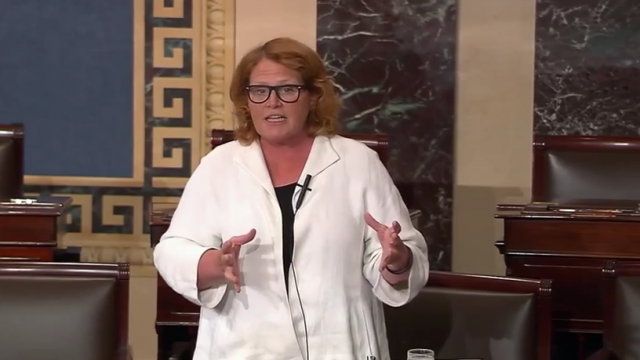Video: Heidi Heitkamp Only Ok With States Rights When It Comes To A Tax Increase

Yesterday Senator Ted Cruz rose in the Senate to ask for unanimous approval for HR3086, a House bill called the Permanent Internet Tax Freedom Act which would make permanent a moratorium on taxing internet access. Currently states cannot tax your internet access though ten states – Hawaii, New Hampshire, New Mexico, North Dakota, Ohio, South Dakota, Tennessee, Texas, Washington & Wisconsin – are grandfathered in.
But that moratorium on an internet access tax is temporary, and expires in November. HR3086, if passed, would make the moratorium permanent.
HR3086, which was co-sponsored by Rep. Kevin Cramer, passed in the US House by a voice vote.
Unfortunately, Senator Cruz’s efforts for a similar outcome in the Senate was unsuccessful, because rising in objection to his call for unanimous approval was North Dakota Senator Heidi Heitkamp.
The video above is of Heitkamp’s objection (you can watch Cruz’s entire speech here).
What was interesting about Heitkamp’s argument against extending the moratorium is that she invoked the 10th amendment and states’ rights. “The imposition doesn’t come from this body,” she said, pointing out that internet access taxes are imposed by the states. “The imposition comes from states and local governments who have sovereign, 10th amendment rights.”
I can respect that argument. I have a deep respect for states rights, and do not necessarily think the federal government should intervene to stop states from imposing poor policy, though I might also argue that the internet is pretty clearly interstate commerce and that Congress protecting it from taxation is well within their purview.
What’s interesting is that Heitkamp seems rather selective in her invocation of the 10th amendment. She objects to a ban on internet access taxes on the basis of 10th rights, but she’s in favor of minimum wage policy including legislation to increase the federal minimum wage t0 $10.10 per hour.
Surely, if Heitkamp belives that internet access taxes should be the responsibility of the state, she also believes that states can set their own labor laws as well, no? Especially since people who live and work in a state are a lot less “interstate commerce” than the internet.




